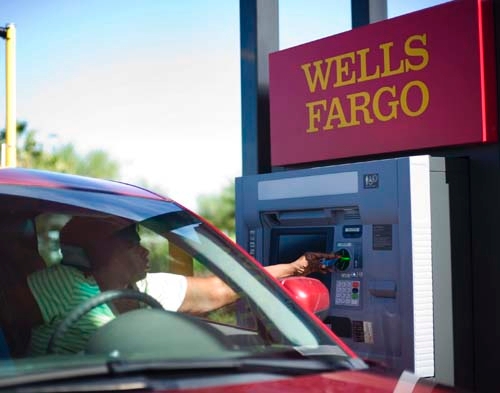Wells Fargo starts to charge debit card fee
Las Vegas customers of Wells Fargo Bank have the dubious honor of being among the first in the nation to pay the bank's $3 monthly debit card fee.
The new charge is on top of ATM fees, overdraft charges, minimum balance rules and check-ordering costs, charges that cost most consumers a minimum of $120 a year.
Wells Fargo Bank customers in Nevada, Oregon, New Mexico, Georgia and Washington will be charged the fee if they make a purchase with a debit card at any time in a month. The new fee went into effect Friday and would first show up on a statement in November, a bank spokeswoman said.
But the fee won't apply if the customer of Nevada's largest bank only uses the card withdraw cash at Wells Fargo ATMs or maintains a high account balance.
Announcement of a similar fee by Bank of America has prompted widespread outrage, but Wells Fargo customers surveyed at the bank's 1021 W. Owens Ave. branch on Friday seemed to take their new fee in stride.
While not pleased by the bank's move, customers said they would rather change payment methods than move their account to another bank or a credit union that won't charge the fee.
"I don't think anybody likes being charged to spend their own money," said Raul Flores, a 53-year-old debit card user from Las Vegas. But Flores said he did not know whether the latest fee was enough to make him switch banks after 20 years.
"I already use my debit card a lot to buy gas and groceries," Flores said. "It's a lot of money to be charged to use my debit card. I'll probably use cash to pay for everything."
Codi Fernandez, a 19-year-old College of Southern Nevada freshman, said the new fee, with his new burden of tuition and books, would be enough for him to consider switching to a no-fee college checking account.
"I already pay $120 a year," he said. "Add $36, now that makes a difference."
Joyce Hamilton, 61, described the debit fee as "harsh," especially for those on a fixed income.
Hamilton, a retired member of Culinary Local 226, said it would be difficult to switch to another bank because her disability checks are directly deposited into her account.
Switching often means canceling direct-deposit and automatic bill-paying options, filling out new-account paperwork and paying for new checks and debit or credit cards.
Theodore Boomer, a frustrated customer in Mableton, Ga., is spearheading a petition drive to get Wells Fargo to cancel its debit card fee.
"This is an outrageous fee when taking into account that it costs the bank less money to process an electronic transaction then a paper check," Boomer said in a letter to Wells Fargo CEO John Strumph.
Rep. Shelley Berkley, D-Nev., one of a growing number of Democrats in Congress calling on U.S. Attorney General Eric Holder to investigate whether big banks are coordinating fee strategies in violation of federal antitrust laws.
"It's time for accountability and an investigation into the big banks' outrageous behavior to determine whether there was any collusion in slapping these new fees on debit card users in Nevada and across the nation," Berkley said.
Rep. Joe Heck, R-Nev., did not respond to a request for comment.
As of Friday, 65 people had signed Boomer's petition, posted on the Change.org website. Compare that with 233,670 signatures on a Change.org petition demanding that Bank of America President and CEO Brian Moynihan drop his bank's proposed $5 monthly fee to start next year.
Wells Fargo and Bank of America aren't alone. Some regional banks, such as SunTrust in Georgia and Regions Financial Corp. based in Birmingham, Ala., are imposing charges of $4 to $5.
One major holdout with branches in Las Vegas has been Citibank, which said it has no plans to charge customers for debit card use. But it may charge a fee if accounts fall below a set balance.
Nevada State Bank, with 55 branches and $3.5 billion in deposits in Southern Nevada, is considering its options.
"With the recent regulatory changes, we anticipate the possibility of future adjustments to our fee structure," Sandi Milton, vice president of public relations and events, said Friday in a statement. "However, at this time we continue to research this very important matter, and no decision has been made."
The move to monthly debit card fees isn't surprising. The banking industry has argued for months that it needs the fees to recoup revenue it will lose because of new federal regulations, including a cap on merchant charges for debit card transactions.
Bank of America, the largest U.S. bank by assets, warned the new rules will cost it $2 billion annually. Wells Fargo and JP Morgan Chase & Co. both estimated their annual loss at $1.3 billion.
Milton declined to estimate the impact on Nevada State Bank.
In its second-quarter earnings report, Zion Bancorporation, Nevada State's holding company, estimated an "annual negative impact on bank-card fees to be approximately $35 million to $40 million pretax, beginning in the fourth quarter."
The Federal Reserve finalized the limits on debit card swipe fees in June. The new rules will cap at 21 cents the fee merchants pay banks each time a customer buys something with a debit card, down from 44 cents.
The rules, known as the Durbin Amendment, were part of last year's Dodd-Frank financial reform legislation and apply to banks with $10 billion and more in assets.
Contact reporter Chris Sieroty at
csieroty@reviewjournal.com or 702-477-3893.

















